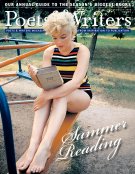When President George W. Bush debated Senator John Kerry shortly before the 2004 presidential election, some sharp-eyed observers noticed a suspicious, rectangular bulge under Bush's suit. Before the debate was even concluded, the Internet was abuzz with speculation that the president had been wearing a transmitter through which aides were feeding him information. The Bush campaign denied the allegation, of course. But it struck many readers of "The Palace Thief"—the title story of Ethan Canin's best-selling collection, published by Random House in 1994, in which an elite prep school student who cheats in an academic competition grows up to become a politician who cheats in a similar contest by receiving answers to questions through an earpiece—as a case of life imitating art.
I’ve written six books, each time thinking it’s the end, but I really sometimes think this could be it. This feels a little different from the others. This feels like a better book than any other I’ve written, or at least more complex.
"Extraordinary, wasn't it?" the author says of Bush's debate performance four years ago. "Especially when you watch some of his reactions. There was that funny look for a second, as if he was getting information—as if somebody was telling him what to say."
But that real-life parallel to "The Palace Thief" was just one in a series of karmic convergences for Canin, who, at forty-seven, is a lifelong student of presidential politics. After being introduced to the author at an event leading up to the Iowa caucuses, about six weeks before dropping out of the race, John Edwards immediately said, "You wrote Emperor of the Air!" referring to Canin's first book, a story collection published by Houghton Mifflin in 1988 when he was only twenty-seven. Gary Hart, the former senator from Colorado whose 1988 presidential campaign was derailed by a sex scandal, read The Palace Thief and subsequently invited Canin onto his Denver-based radio show to discuss literature and political corruption. (Canin accepted the offer, and the interview was broadcast in 1994.) The author also participated in one of the Renaissance Weekends—annual retreats for "innovative leaders" from diverse fields, once attended by Bill and Hillary Clinton—in the mid-nineties. And in one of the most bizarre coincidences of his literary-political life, Canin was unnerved earlier this year when New York governor Eliot Spitzer, widely viewed as an inevitable presidential candidate someday, was linked to a prostitution ring known as the Emperor's Club—which happens to be the title of the 2002 film version (starring Kevin Kline) of "The Palace Thief."
If character is fate, as a classics professor quotes Heraclitus as saying in that book, then it was destiny that a political junkie like Canin—who scours as many as a dozen newspapers and Web sites each day for the latest campaign news—would eventually write America America, published this month by Random House. His fourth novel, and the first since Carry Me Across the Water (Random House, 2001), America America—the title refers to a line in "America the Beautiful," which in a late scene becomes a kind of funeral dirge—is Canin's magnum opus, a sprawling page-turner that is at once a Gatsby-like meditation on class and a haunting elegy for American liberalism in the early seventies, when it took a beating from which it's still recovering. Corey Sifter, the book's narrator, tells the story of his evolution from plumber's son to newspaper publisher through the patronage of the enlightened aristocrat Liam Metarey, whose backing of a politically admirable but deeply flawed Democratic presidential candidate in 1972 ends in scandal and tragedy. Edmund Muskie, George McGovern, and the ominous, offstage presence of Richard Nixon float through Canin's tale like ghosts, as does the 1969 Chappaquiddick incident, echoed by the story of Henry Bonwiller, a liberal senator from New York State whose bid for the White House is derailed by revelations of his involvement with a young woman who turns up dead.
"It's his best and most ambitious book, no question," says poet Chard deNiord, a longtime friend of Canin's from their days as graduate students at the Iowa Writers' Workshop, and now one of his most trusted manuscript readers. "Certainly it's the political book he's been waiting to write his whole career. It's also his most carefully woven and crafted book, which he had to reach his current level of maturity—personally and politically—to complete."








